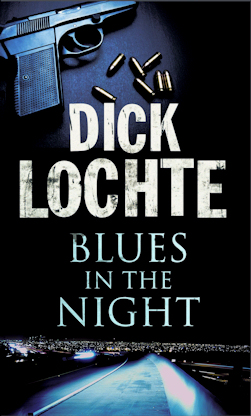Dick Lochte
Blues in the Night
Severn House, 2012
After his release from prison, Dave Mason nicknamed Mace lives in his father's house in the swamps of Louisiana, unless he gets a call from Los Angeles from his an old acquaintance, crime boss Paulie Lacotta. Mace is to partnered up with Wylie, a relative of Lacotta, and together with an inexperienced partner Mace should watch Angela, the former girlfriend of Paulie, which seems to take the side of Lacotta’s competitor Tiny Daniels. After several days of surveillance Mace does not find anything suspicious in Angela’s actions, until suddenly he is threatened by a pair of hitmen (one of them looks like Elvis Presley, only with the brain of a five year old child). Mace saves himself from the murderous men, but Wiley is less fortunate: Mace finds him dead in a room from where Mace watched the subject. Mace understands that Lacotta withheld from him some of the circumstances of the case.
Mace for all his skills and abilities is nominally not a private investigator, although Blues in the Night was nominated to Shamus Award for Best Novel. Mace even has some intersection with the well-known Californian private detective Jim Rockford from The Rockford Files: they are both from California, both ex-cons, but on this the similarities end. Rockford is an example of proper socialization compared to Mason, who do not have either friends nor significant ties.
Mace is well aware that he is working for a person from the criminal world, but it does not bother him. He missed the action, and where else can you get it, if not in LA. Lochte after the locally-paced beginning throws in the elements of international intrigue and dark behind the scenes of show business. Among the villains here are Russian mafia.
The plot is flying like a bullet, and Mace has to understand the intricacies of the difficult affair, in which he got himself involved. Toward the middle of the novel you even begin to think ере Lochte has overdone with twists and suspects: the characters begin to run around too much and think too little. But to the end the situation is improving.
The only my concern was the negligence of the author to reconstructing the image of the Russian mafia. They are cartoon villains, and have even non-existent names. The main boss named Max Brox, and his mercenaries Gulik and Klebek. Lochte very colorful and accurately describes Los Angeles, he can spend a little time on the reconciliation of the names.
«Mace moved past the carbo-pounders to a side exit leading to an outdoor patio behind the main building. It had once been the Egg's busiest spot, but the bravery that allowed The Killer Cafe's patrons to ignore the mug shots of murderers evidently did not extend to a more mundane threat like skin cancer. Most of the tables were unoccupied, even those under the protective cover of faded red umbrellas.»
Mason apparently enters the pantheon of LA detectives as one of the best.

No comments:
Post a Comment